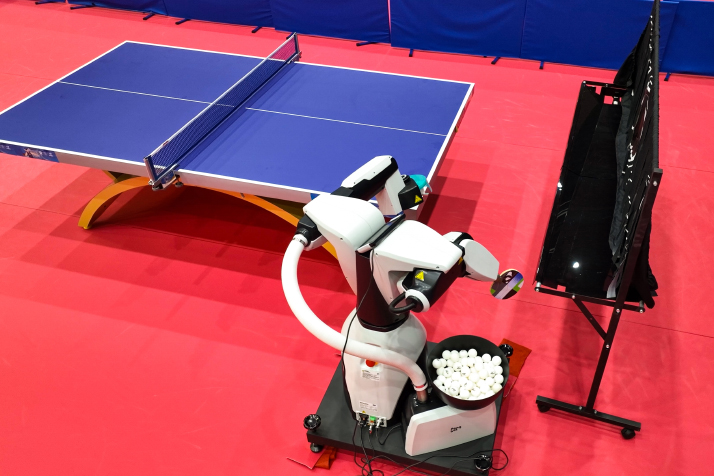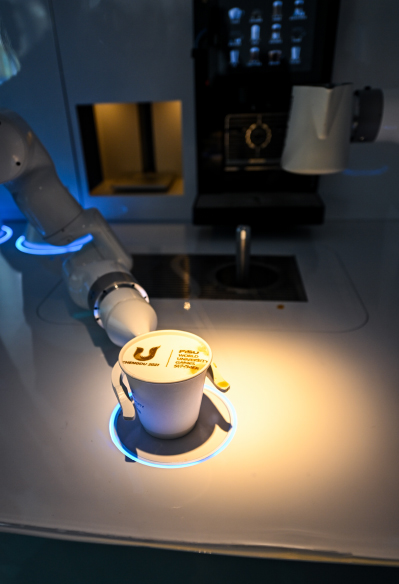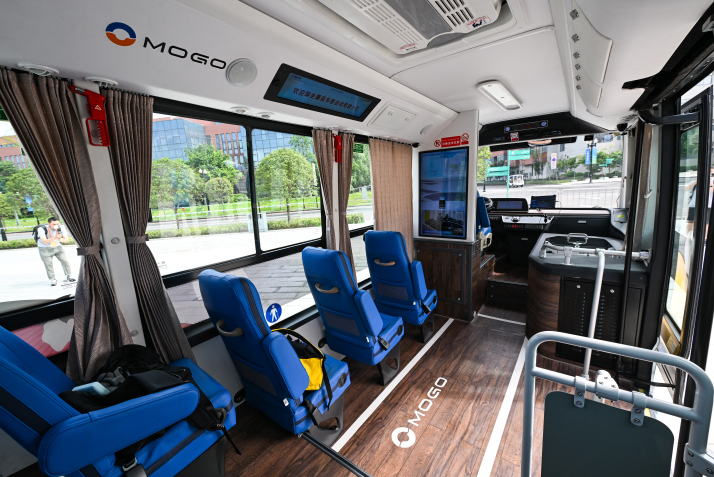Technologies shine at Chengdu World University Games

A robotic table tennis coach at a stadium in Chengdu on July 22 (XINHUA)
Featuring a big head, big eyes and a big round belly, a robot named after Rongbao, the panda mascot of the Chengdu World University Games, or the Universiade, held in the capital of Sichuan Province, drew widespread attention at the Games.
Rongbao is a service robot with emergency functions. It can deliver first-aid kits, automated external defibrillators (AEDs)—portable, life-saving devices designed to treat people experiencing sudden cardiac arrest, and other medical tools. When an emergency occurs, people can directly call the Rongbao robot using a mini-program on the ubiquitous super app Weixin on their mobile phones, and the robot will deliver a first-aid kit and an AED at a speed of 1.2 meters per second, or around 4.3 km per hour. After arriving at the location, the robot automatically plays a video on how to quickly and correctly use the AED.
Zhang Ruirui, Chairman of Chengdu Ruileda Robot Technology Co. Ltd., the company that developed the robot, told news portal Chengdu.cn that he and his team had been thinking about how to apply new technologies to the Universiade. After visiting the venues of the Games, they found the number of AEDs at the venues was limited and they were hard to find.
"If an emergency occurs, people will not be able to quickly find the equipment," Zhang said. "The Rongbao robot solves this problem and it can deal with emergencies both inside and outside the stadiums."
In addition to providing emergency assistance, Rongbao also has other functions such as language interpretation and providing directions. The robot has mastered multiple languages including English, Japanese, Korean and Spanish. Cameras installed beneath its feet enable it to detect obstacles from one meter away and avoid them when guiding athletes and spectators.
Rongbao is also capable of communication as it is equipped with large language models such as ERNIE Bot, a large language model and ChatGPT-like product launched by Baidu. After the Games, the robot will continue to be used in public places.
Zhang said the Chengdu Universiade has provided an opportunity for domestic artificial intelligence companies to showcase their products and communicate with the world. In addition to Zhang's team, many technology companies in China have contributed their newest technologies and products to the Universiade and the application of modern technologies has become a major characteristic of the event.

A cup of coffee made by a coffee-making robot at the FISU Games Village in Chengdu, Sichuan Province, on July 15 (XINHUA)
Going smart
In addition to Rongbao, a robotic table tennis coach also made an appearance at the Games. The robot is more patient and efficient than a human coach. The advantage of robotic coaches lies in basic skills training. The robot can help athletes train in the 22 basic movements of table tennis. Through communication with professional table tennis teams, researchers found that improving basic skills can help players break through technical bottlenecks.
The system uses machine vision, enabled by industrial cameras, lenses and lighting, to capture the characteristics of standard basic table tennis movements and form a model. Then it compares athletes' movements with the model, finds the differences and provides feedback for athletes to make adjustments.
The technologies applied at the Games also have a human touch. When athletes and volunteers felt hot, thirsty or hungry, they were able to find technological products to satisfy their needs.
For instance, cooling scarves and vests made of a material used in the aerospace industry helped volunteers working outdoors to cope with high temperatures. The vests and scarves are able to maintain a temperature of 23 degrees Celsius for up to two hours, which is equivalent to carrying an air conditioner.
In the dining halls, smart coffee machines could produce a cup of coffee in just 90 seconds, from grinding the beans to creating the latte art. When athletes and volunteers missed lunch or dinner, they could get dishes such as wontons in just two minutes from a 24-hour unmanned smart vending machine in the Chengdu Universiade Athletes' Village.
Within the village, autonomous buses developed by Mogo Auto, a Chinese autonomous vehicle startup, provided spectators and athletes with safe and convenient transportation services.
After around 10 passengers boarded a bus, a safety officer would select the destination on a touchscreen, sending the bus on its way. Throughout the entire journey, there was no need for the safety officer to steer, as the steering wheel automatically rotated according to the road conditions.
The vehicle is capable of sensing obstacles within a 200-meter range and has a response time of only 0.1 second. As a result, it can safely and efficiently handle various complex urban traffic conditions.

A self-driving bus in the World University Games Village in Chengdu, Sichuan Province, on July 15 (XINHUA)
Going green
Low-carbon and green technologies were also applied inside the Games' venues. Water-permeable concrete was used around the Xindu Xiangcheng Sports Center, the venue for water polo competitions during the Games. After falling onto the concrete, rainwater quickly disappears and the surface of the concrete dries. After soaking through the concrete, the rainwater is collected and purified, before being used for watering plants, cleaning and central air conditioning. The system enables the center to save more than 3,000 cubic meters of water every year, reducing the venue's water consumption by 20 percent.
In addition to saving water, the stadiums for the Games were all energy-efficient. For instance, the volleyball gym at Chengdu University has a 600-square-meter glass skylight, which helps the stadium save power consumption by 300 to 500 kilowatt-hours a day, equivalent to three months of electricity consumption for a household of three.